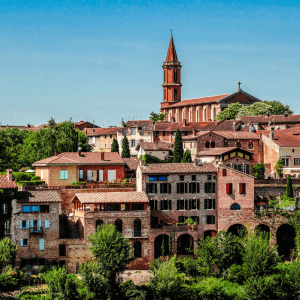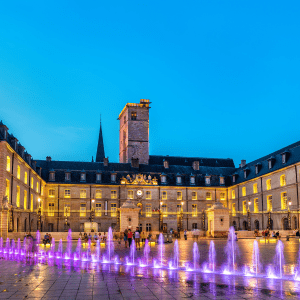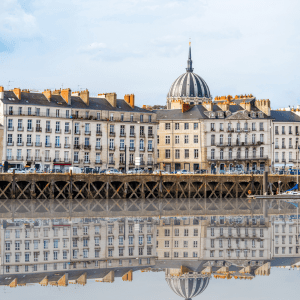# let's Grow Your Hand
Study in the France: Your Roadmap to Success!
Navigate Your Path to Success - Expert Guidance for Studying Abroad in the Land of Opportunities!
Why Study in France?
France consistently ranks high in global education indices, ensuring that students receive top-notch education and exposure to a multicultural society. The emphasis on innovation and technological advancement makes France institutions leaders in various fields.
Academic Excellence
Benefit from world-renowned universities and cutting-edge research, ensuring a top-tier education that opens doors globally.
Diverse Culture
Immerse yourself in a melting pot of cultures, ideas, and perspectives, fostering personal growth and a truly enriching experience.
Career Opportunities
Gain access to a dynamic job market with ample internship and post-graduation employment opportunities, setting the stage for a successful career.
Innovation Hub
Join a country at the forefront of innovation and technology, offering a stimulating environment for creativity and entrepreneurial pursuits.
Quality of Life
Experience a high standard of living, excellent healthcare, and a variety of recreational activities, making the France a well-rounded and desirable destination for international students.
The Transformative Benefits of Choosing to Study
Discover the world, expand your mind! Choose to study abroad for top-notch education, cultural immersion, and personal growth. Your journey to global success starts here!
Choose Your Desired Courses
Discover the world, expand your mind! Choose to study abroad for top-notch education, cultural immersion, and personal growth. Your journey to global success starts here!
Choose Your Interested Location in France
Discover academic excellence amidst stunning landscapes. Study in France for a vibrant cultural experience, renowned universities, and opportunities in tech and entertainment industries.



Paris
- Phone:+1 (859) 254-6589
- Email:info@example.com



Lyon
- Phone:+1 (859) 254-6589
- Email:info@example.com



Albi
- Phone:+1 (859) 254-6589
- Email:info@example.com



Antibes
- Phone:+1 (859) 254-6589
- Email:info@example.com



Dijon
- Phone:+1 (859) 254-6589
- Email:info@example.com



Montpellier
- Phone:+1 (859) 254-6589
- Email:info@example.com



Nantes
- Phone:+1 (859) 254-6589
- Email:info@example.com
Admission requirements for studying in France
Planning to study in the France? Let us help you get started with the basic admission requirements that you will need.
Preparing for Examinations
Pursuing a course in the France begins with competitive and rigorous exams such as GRE/GMAT for postgraduate studies and IELTS or TOEFL for English proficiency. Some programs do not require GRE/GMAT. Thorough preparation is vital as these exams significantly influence university admissions.
University Application Process
The application process involves submitting academic transcripts, letters of recommendation, a statement of purpose, and exam scores. Meeting application deadlines and following specific university guidelines are critical to success.
Figuring Out Your Finances
A full-time program in the US can cost up to ₹ 70Lacs. Planning your finances is essential, considering options like scholarships and loans, though the latter may come with high-interest rates.
Visa Process
Applying for a student visa entails presenting the necessary documentation, attending an interview, and paying a fee. It is advisable to start this process early to avoid delays.
Booking Your Travel
Early travel bookings are recommended, as costs can be high, especially during peak seasons. Consider budget airlines and travel packages to minimize expenses.
Finalizing Your Stay
The cost of accommodation varies based on location and preferences. Exploring housing options early allows for a more budget-friendly selection, whether choosing university housing or private rentals.
How You Can Manage expenses while studying in the France
Our programs offer financial aid and the chance to study in France at low cost. Here's how international students in France manage their living expenses while studying there.
Opting for hybrid programs, which combine online and in-person classes, can offer significant cost savings. These programs allow students to complete a portion of their coursework remotely, reducing expenses associated with accommodation, transportation, and on-campus living.
The flexibility of hybrid programs enables students to strike a balance between academic pursuits and managing their budget effectively.
France is home to numerous institutions and organizations that offer a wide range of scholarships for international students. These scholarships can cover tuition fees, living expenses, or a combination of both. It is crucial for students to research and apply for available scholarships well in advance.
Many academic institutions and governmental bodies provide financial aid based on merit, need, or specific criteria related to the student’s field of study. Applying for scholarships can significantly alleviate the financial strain of studying abroad.
Taking out student loans is a common method for funding education in France. Financial institutions, both in France and in the student’s home country, often provide loans specifically tailored for international students. Before opting for a loan, it is essential to thoroughly understand the terms and conditions, interest rates, and repayment plans.
Students should explore government-sponsored loan programs and private financial institutions to identify the most suitable loan options that align with their financial capacity.
France allows international students to work part-time during their studies. Engaging in part-time employment not only provides students with valuable work experience but also contributes to covering living expenses. Most students work in sectors such as retail, hospitality, or on-campus roles.
It is important, however, to strike a balance between work and academics, ensuring that employment commitments do not compromise the quality of education.


























Everything You Need To Know About France
France, the epitome of elegance and sophistication, is a country that truly captivates the senses. Situated in Western Europe, it shares borders with several countries including Belgium, Luxembourg, Germany, Switzerland, Italy, Spain, and Andorra. With its rich history dating back thousands of years and its contributions to art, literature, fashion, and cuisine – France has become an influential cultural powerhouse.
When we think of France's iconic landmarks – the majestic Eiffel Tower immediately comes to mind. Standing tall in the heart of Paris since 1889; it offers panoramic views of the city below. Another must-visit destination is the Louvre Museum which houses priceless works such as Leonardo da Vinci's Mona Lisa.
French cuisine is renowned worldwide for its exquisite flavors and meticulous preparation. From buttery croissants to savory escargots and indulgent cheese platters – every bite tells a story. Don't forget to pair your meal with a glass or two of fine French wine!
Beyond food and landmarks lies an intricate tapestry woven by centuries of history. From Roman conquests to medieval castles - each region boasts its own unique charm and historical significance.
But France isn't just about monuments; it also prides itself on being at the forefront of fashion trends. Paris Fashion Week is a global event that showcases designs from some of the world's most celebrated designers.
As you wander through quaint villages or stroll along picturesque coastlines dotted with lavender fields or vineyards - you'll experience firsthand why France holds such allure for travelers seeking beauty in every corner.
France has a rich and fascinating history that spans thousands of years. From ancient Gaul to the Roman Empire, from medieval knights to the French Revolution, this country has been at the center of countless historical events.
One of the earliest civilizations in France was that of the Celts, who inhabited the region around 600 BC. The Romans later conquered Gaul in 51 BC and ruled it for several centuries. During this time, Christianity began to spread throughout the land.
In medieval times, France saw great advancements in art, literature, and architecture. The Gothic cathedrals like Notre-Dame de Paris are still standing today as testaments to this period's creativity and craftsmanship.
The French Revolution marked a turning point in history when citizens rose up against monarchy and demanded their rights and freedoms. This event had far-reaching consequences not only for France but also for other countries across Europe.
In more recent times, France played an active role during both World Wars. It experienced occupation by Nazi Germany during World War II but ultimately emerged as one of the victorious Allied powers.
Today, France continues to be a major player on the global stage with its rich cultural heritage serving as a constant reminder of its storied past.
France boasts one of the largest and most developed economies in the world. It is classified as a mixed economy, blending elements of both capitalism and socialism. The country has a highly diversified economic base, with key sectors including manufacturing, services, agriculture, and tourism.
Manufacturing plays a crucial role in France's economy, particularly in industries such as aerospace, automobile production, pharmaceuticals, and energy. Some of the world's leading companies have their headquarters or major operations based in France.
The services sector also contributes significantly to the country's GDP. France is renowned for its luxury goods industry, fashion houses like Chanel and Louis Vuitton being globally recognized brands originating from here. Additionally, finance, hospitality and healthcare services are thriving sectors in the French economy.
Agriculture remains an important part of France's economy despite its declining share in GDP over recent decades. The country is known for its wine production; it is one of the largest wine producers worldwide.
Tourism also plays a vital role in boosting France's economic growth. With iconic landmarks such as the Eiffel Tower and historical sites like Versailles attracting millions of visitors each year.
These diverse sectors contribute to France maintaining a strong position on the global economic stage.
The governance structure in France holds substantial significance, contributing significantly to the country's functionality. Operating within a semi-presidential system, France features both a President and a Prime Minister. The President wields executive powers, while the Prime Minister oversees day-to-day governance affairs.
Various branches constitute the French government, with the legislative branch, known as the French Parliament, being paramount. This branch encompasses two houses: the National Assembly and the Senate, with members elected by citizens through democratic processes.
France's involvement in the European Union (EU) further shapes its governmental framework. As an EU member state, France actively engages in decision-making at both national and supranational levels.
Political parties in France, including La République En Marche!, Les Républicains, Socialist Party, and National Rally, exert influence on governmental policies and decisions.
The French government addresses diverse facets, encompassing economic development, social welfare programs, healthcare provisions, infrastructure initiatives, environmental conservation, and more. Its objective is to foster societal stability while effectively addressing citizens' pressing concerns.
The French government holds a pivotal role in shaping policies and decisions that impact every facet of citizens' lives. Its significance lies in ensuring seamless governance and effectively addressing societal needs. Through collaborative efforts among different branches, political parties, and active citizen participation, France continually adapts politically to meet the challenges of the contemporary world.
France is a country with a diverse and vibrant population. As of 2021, it has an estimated population of over 67 million people. The French population is known for its rich cultural heritage and traditions.
One interesting fact about the population in France is that it is one of the most populous countries in Europe. It ranks second after Germany in terms of population size. The majority of the population resides in urban areas, with Paris being the largest city and serving as the economic and cultural hub of the country.
The French society embraces diversity, with people from various ethnic backgrounds living together harmoniously. Over time, France has become home to immigrants from different parts of the world, contributing to its multicultural fabric.
In terms of demographics, France has a relatively low birth rate compared to other European countries but maintains a stable population growth due to immigration. This contributes to its dynamic social makeup and ensures a constant exchange of ideas and perspectives.
France's population plays an integral role in shaping its culture, lifestyle, and economy. With its diverse mix of people from different backgrounds coming together under one roof, it creates a unique blend that makes France an intriguing destination for both residents and visitors alike.
Culture and lifestyle in France are vibrant and diverse, reflecting the country's rich history and influence on global art, fashion, cuisine, music, and cinema. French culture is known for its emphasis on refinement, elegance, and appreciation for the finer things in life.
One of the defining aspects of French culture is its love for gastronomy. The French take great pride in their culinary traditions and consider food an essential part of their cultural identity. From indulging in a delectable croissant or baguette to savoring a multi-course meal at a Michelin-starred restaurant, food holds a special place in everyday life.
The arts also play a significant role in French culture. France has been home to many influential artists throughout history like Claude Monet, Auguste Rodin, Edith Piaf, Coco Chanel - just to name a few. Today it continues to be an artistic hub with world-renowned museums like the Louvre housing masterpieces from various periods.
French people value leisure time as well; they prioritize work-life balance with long vacations during summer months when many businesses temporarily close down. This allows them ample opportunity to enjoy outdoor activities such as picnics along the Seine River or leisurely strolls through charming neighborhoods.
Fashion is another integral part of French lifestyle. Paris remains one of the leading fashion capitals where designers showcase their latest collections during prestigious events like Paris Fashion Week. The elegant style associated with Parisians can be seen not only on runways but also reflected in everyday attire.
Coffee culture is deeply ingrained within society too - sitting at outdoor cafes enjoying espresso or cappuccino while people-watching is an iconic pastime loved by many locals.
France boasts a vibrant cultural scene encompassing art galleries/museums showcasing renowned works; culinary experiences highlighting gourmet delights; fashionable streets filled with stylish individuals embracing timeless elegance; plus coffee shops offering relaxation amidst lively ambiance.
When it comes to geography, France offers a diverse and captivating landscape. From the snow-capped peaks of the French Alps to the picturesque beaches of the French Riviera, this country has something for everyone.
In the north, you'll find rolling hills and fertile farmland that stretches as far as the eye can see. This region is known for its charming villages and stunning countryside. Moving southwards, you'll encounter beautiful vineyards in regions like Bordeaux and Burgundy, producing some of the world's finest wines.
The central part of France is dominated by the Massif Central mountain range, offering breathtaking scenery and outdoor activities such as hiking and skiing. And let's not forget about Corsica - a Mediterranean island with rugged mountains and pristine beaches.
France is also blessed with numerous rivers including the Seine in Paris, which adds to its charm. The country boasts an extensive coastline along both the Atlantic Ocean and Mediterranean Sea.
With such diverse geography, it's no wonder that France attracts nature lovers from all over the world. Whether you're looking to explore mountains, relax on golden sandy beaches or wander through lush green forests, there's always an adventure waiting for you in this enchanting country.
When it comes to climate, France offers a diverse range of weather patterns due to its varied geographical features. The country is divided into several regions, each with its own unique climate.
In the northwestern part of France, you'll find a temperate maritime climate, characterized by mild winters and cool summers. This region receives ample rainfall throughout the year.
Moving towards the east, the climate becomes more continental. Summers are warmer and winters are colder compared to the northwestern coast. Snowfall is common in this region during winter months.
The southern part of France enjoys a Mediterranean climate, known for its hot and dry summers. Winters are generally mild and rainy in this area.
In mountainous areas like the Alps and Pyrenees, you'll experience an alpine climate with cold winters and heavy snowfall. These regions offer excellent opportunities for skiing and other winter sports activities.
France's climatic diversity makes it an appealing destination for all kinds of outdoor enthusiasts - from beach lovers on the French Riviera to skiers in the mountains!
So whether you're planning a summer vacation or hitting the slopes in winter, there's something for everyone when it comes to experiencing France's captivating weather patterns!
The education system in France is highly regarded worldwide for its emphasis on academic rigor and excellence. It is known for its comprehensive approach and structured curriculum that prepares students for higher education and professional life.
In France, education is compulsory from the age of three until 16. The system is divided into different levels: primary school (école primaire), middle school (collège), and high school (lycée). Each level focuses on specific subjects and skills development.
Primary schools lay the foundation for children's learning journey, focusing on basic literacy, numeracy, social skills, and creativity. Middle schools build upon these foundations by introducing more specialized subjects like science, history, geography, foreign languages, and physical education.
Once students complete middle school successfully, they can choose between two paths: general or vocational. General high schools offer a broad range of subjects leading to the French Baccalaureate diploma - a prerequisite for university admission. Vocational high schools provide specialized training in various fields such as mechanics or hospitality.
Higher education in France comprises universities and specialized institutions called grandes écoles which are renowned for their rigorous selection process. These institutions offer programs ranging from bachelor's degrees to doctoral studies across various disciplines.
Additionally, the French government invests heavily in research and innovation through numerous public research organizations such as CNRS (National Center for Scientific Research) to foster scientific advancement across multiple domains.
The French education system prioritizes academic excellence while also nurturing critical thinking skills necessary for personal growth and success in today's global society.
For those who are considering studying in France, it is important to be familiar with the country's student visa requirements. The process of obtaining a student visa can seem daunting at first, but with proper planning and preparation, it can be a smooth experience.
To study in France as an international student, you will need to apply for a long-stay student visa (VLS-TS). This type of visa allows you to stay in the country for the duration of your studies. It is important to note that you should start the application process well in advance as it may take several weeks or even months to receive your visa.
The first step is to contact the French consulate or embassy in your home country and inquire about the specific requirements for obtaining a student visa. Generally, you will need to provide documents such as proof of acceptance from a recognized educational institution in France, evidence of financial means to support yourself during your stay, valid passport, medical insurance coverage, and sometimes proof of language proficiency.
Once you have gathered all the necessary documents, you can submit your application at the consulate or embassy. It is advisable to make an appointment beforehand as walk-in applications might not be accepted.
After submitting your application and paying any applicable fees, it will undergo processing by the authorities. Upon approval of your visa application, you will receive a notification along with information on how and when to collect your passport with the attached visa sticker.
It is crucial that once you arrive in France on a student visa, you comply with all its conditions. These may include registering at an educational institution within certain time frames and maintaining appropriate academic progress throughout your studies.
In addition to studying abroad experiences that broaden horizons and open up new opportunities academically and culturally; studying in France also allows students access to various part-time job opportunities while they pursue their degrees – providing them valuable work experience alongside education!
As mentioned earlier: Student life isn’t just about studying; it’s also about experiencing new cultures, making new friends, and
let's Stand Together
Study in the France
Find programs that match your eligibility and aspirations then apply with reduced application fees, a free assessment and access to a dedicated advisor.
Latest News
Standards compliant e-business.Phosfluorescently expedite functional products via premium action
items wireless innovation compliant e-business.
Concerned About Expenses? Tips for Managing Your Budget While Studying Abroad
Are you dreaming of studying abroad, immersing yourself in a new culture, and gaining valuable life experiences? The allure of […]
Is Culture Shock Real? Navigating the Uncharted Territories of Studying Abroad
Hey there globetrotters and adventure seekers! Are you ready to embark on a journey that will broaden your horizons, challenge […]
Wondering Where to Begin? How to Choose the Perfect Study Abroad Destination
Are you feeling a little adventurous? Maybe a bit curious to explore the world beyond your campus walls? Well, studying […]
Frequently Asked Questions (FAQs)
Your Go-To Guide for a Smooth Journey to Graduate Success!
France is renowned for its world-class education system, diverse cultural experiences, and the opportunity to learn in an international environment. It offers a rich history, vibrant cities, and a high-quality academic reputation.
While many programs are offered in English, having a basic understanding of French is beneficial. Some programs may require proficiency in French, and language proficiency tests like the DELF or DALF may be necessary.
To obtain a student visa, you generally need an acceptance letter from a French university, proof of financial means, and health insurance. Detailed instructions and requirements can be found on the official website of the French consulate or embassy.
The cost of living varies depending on the city, but on average, it includes accommodation, food, transportation, and other personal expenses. Check with your chosen university or local authorities for specific cost estimates.
Yes, international students are allowed to work part-time during their studies. However, there are restrictions on the number of hours you can work, and certain conditions must be met. Consult the French immigration authorities for the latest regulations.
Yes, there are various scholarships and financial aid options available for international students. These may be offered by the French government, individual universities, or external organizations. Explore scholarship opportunities based on your course and eligibility.
The duration varies based on the level of study. Bachelor’s programs typically last three years, master’s programs are usually two years, and doctoral programs can take three to five years. Check with your specific university and program for accurate information.
International students are required to have health insurance coverage. Many universities offer health insurance plans, and there are also private insurance options. Familiarize yourself with the healthcare system and insurance requirements upon arrival.
Yes, French universities often organize cultural events, language exchange programs, and various student clubs. Engaging in these activities can enhance your cultural experience and help you meet fellow students.
Universities in France typically provide support services for international students, including orientation programs, academic advising, language support, and assistance with administrative procedures. Additionally, there are often dedicated international student offices to address specific needs.
Useful Links
Subscribe Now
Don’t miss our future updates! Get Subscribed Today!
©2024. Geniustudy. All Rights Reserved.




